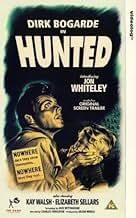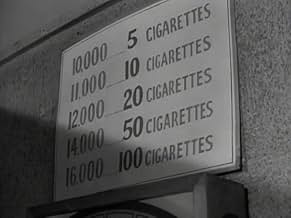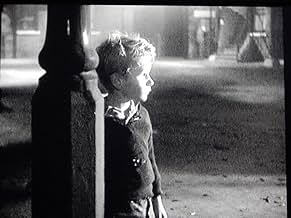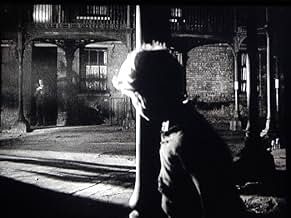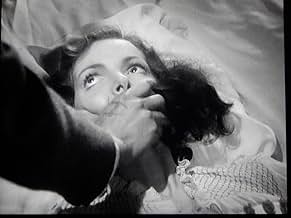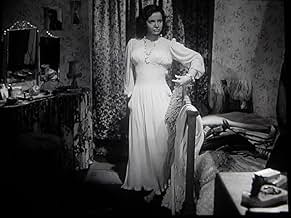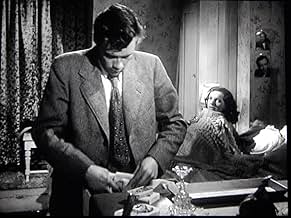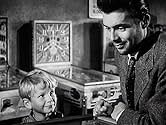NOTE IMDb
7,3/10
1,5 k
MA NOTE
Un criminel violent et un petit enfant agressé font alliance pour fuir l'autorité.Un criminel violent et un petit enfant agressé font alliance pour fuir l'autorité.Un criminel violent et un petit enfant agressé font alliance pour fuir l'autorité.
- Réalisation
- Scénario
- Casting principal
- Récompenses
- 1 victoire au total
Avis à la une
....and "Gloria" (1980) and "Leon" as well...Charles Crichton,whose career spans the second half of the century ("a fish named Wanda"!),is definitely a director to upgrade.
"Hunted" is a small gem ,a suspenseful sensitive story which casts Bogarde as an unlucky murderer on the lam and young John Whiteley as a moving kid.A road movie,from the bleak city to the wild moors of Scotland ,where a special chemistry between the man and the boy literally grows on the audience .
Spoilers.Spoilers. Like all the great storytellers ,Crichton introduces first Bogarde as the "villain " who abducts a cute brat.But further acquaintance shows this:actually both of them are victims of a society that increases the prestige of money ,of Bogarde's boss who sleeps with his wife ,a society that does not care a little bit about its orphans whom it leaves to hateful "parents" .The boy really acts as if he's got nothing to lose.
Admirable sequence :In a bedroom they share for one night,Bogarde begins a bedtime story for his protégé:it's a fairy tale ,a story of a giant.But little by little ,the story becomes HIS own story :what a smart way of letting us know about the hero's past!During this sequence ,which takes place halfway through the film,we see the boy SMILE for the first time.His face is so beaming we are on the verge of tears .He will laugh later ,in his pal's mean brother's house ,during the meal.When Bogarde sails away with his "hostage" ,he makes the story he told come true . End of spoilers .end of spoilers
Bogarde's rendering is a real tour de force and many consider this part
his first important one:tense,distraught,anguished,he runs the whole gamut of emotions.Matching him every step of the way is Whiteley's performance :in the three examples I mention at the beginning of my comment ,which I admire (with the exception of Besson's) ,the young actors cannot hold a candle to him.Instant karma:he won a special AA the following year,and was given the main part in Lang's "Moonfleet" in 1954.He was to meet again Bogarde in "Spanish gardener".
Crichton had often been labeled "for the whole family".But they totally missed the point:"hunted" is not a rosy work,its open ending does not settle the things ,but increases our fear of what will become of our two so endearing heroes.His directing is now nervous -the first sequences when the heroes do not stop running -,now intimate -all the scenes where the two characters hang on to each other,now poetic -the seagulls which accompany the triumphant voyage .A wonderful use of nature (not unlike Charles Laughton's "the night of the hunter") and its wildlife where the runaways take refuge.
Wonderful movie.
"Hunted" is a small gem ,a suspenseful sensitive story which casts Bogarde as an unlucky murderer on the lam and young John Whiteley as a moving kid.A road movie,from the bleak city to the wild moors of Scotland ,where a special chemistry between the man and the boy literally grows on the audience .
Spoilers.Spoilers. Like all the great storytellers ,Crichton introduces first Bogarde as the "villain " who abducts a cute brat.But further acquaintance shows this:actually both of them are victims of a society that increases the prestige of money ,of Bogarde's boss who sleeps with his wife ,a society that does not care a little bit about its orphans whom it leaves to hateful "parents" .The boy really acts as if he's got nothing to lose.
Admirable sequence :In a bedroom they share for one night,Bogarde begins a bedtime story for his protégé:it's a fairy tale ,a story of a giant.But little by little ,the story becomes HIS own story :what a smart way of letting us know about the hero's past!During this sequence ,which takes place halfway through the film,we see the boy SMILE for the first time.His face is so beaming we are on the verge of tears .He will laugh later ,in his pal's mean brother's house ,during the meal.When Bogarde sails away with his "hostage" ,he makes the story he told come true . End of spoilers .end of spoilers
Bogarde's rendering is a real tour de force and many consider this part
his first important one:tense,distraught,anguished,he runs the whole gamut of emotions.Matching him every step of the way is Whiteley's performance :in the three examples I mention at the beginning of my comment ,which I admire (with the exception of Besson's) ,the young actors cannot hold a candle to him.Instant karma:he won a special AA the following year,and was given the main part in Lang's "Moonfleet" in 1954.He was to meet again Bogarde in "Spanish gardener".
Crichton had often been labeled "for the whole family".But they totally missed the point:"hunted" is not a rosy work,its open ending does not settle the things ,but increases our fear of what will become of our two so endearing heroes.His directing is now nervous -the first sequences when the heroes do not stop running -,now intimate -all the scenes where the two characters hang on to each other,now poetic -the seagulls which accompany the triumphant voyage .A wonderful use of nature (not unlike Charles Laughton's "the night of the hunter") and its wildlife where the runaways take refuge.
Wonderful movie.
From the opening scenes of Hunted, directly after the credits, when the dramatic music accompanies a little boy running through the streets of London clutching a teddy bear, we just know this is going to be a great film and it certainly is. Filmed in England and Scotland in late 1951 and released early in 1952, this truly is a wonderful film. The boy is six years old orphaned Scots boy Robbie Campbell (a truly outstanding debut performance by six years old Scots boy Jon Whiteley), who is running and searching for somewhere to hide after accidentally setting the kitchen curtains on fire in his adoptive London home and, believing he has set the house on fire, is fleeing the severe punishment that he believes will be meted out to him by his cruel and violent adoptive father. He ends up running into a derelict building on a bomb site some distance from home where he accidentally comes upon a man, Chris Lloyd (Dirk Bogarde), having just murdered his wife's lover in a crime of passion. Seeing that Robbie has seen the body and is the only witness to his crime, Chris abducts him and takes him on the run with him as he attempts to flee the country and the long arm of the law. Robbie, unloved at home and cruelly treated by his adoptive father, dare not return home and a bond develops between the two fugitives as Robbie flees his adoptive father and Chris flees the police and the hangman's rope.
Chris is at first completely uncaring and rough in his attitude to Robbie, but he gradually takes on the responsibility for Robbie's devotion as the two flee from London and travel up through the midlands to Stoke-on-Trent and then north into Scotland. As the journey gets tougher, Chris has to force Robbie to keep going, to carry him in his arms and to hold him, against the cold, as they sleep out in the wilderness.
It really is a superbly made drama and I read somewhere that, of all the many Rank films Dirk Bogarde made during his long career, this was his personal favourite. It is also a film record of a bygone post-war Britain; from its bomb sites and tramcars and horse drawn traffic in the capital, to the now long gone pottery factories of Stoke on Trent, belching forth their black smoke from huge bottle ovens and covered with industrial grime. The railway scenes in the film were filmed on the equally now long gone Potteries Loop Line at Burslem, Stoke-on-Trent, one of hundreds of lines that fell under the Dr Beeching axe in the 1960's. All completely gone now, but captured for posterity on 35mm black and white film in Hunted.
The film is also a social record of the UK in 1951, a time of general poverty; of post-war austerity and ration books, when everybody dresses so drably. The police in the film may, by modern standards, seem to be having great difficulty in tracking down Chris and Robbie. But you have to take into account the fact that in those days, television was in its infancy; the police had no personal radio communications or computers or helicopters and the pace of life was very different. In real life 1951, a man on the run could quite easily abduct a little boy and take him all over the country with him without being apprehended. So this film then is a contemporary account of how things would have been back in 1951.
Today, in an increasingly paranoid age when, in the minds of many, man abducting little boy equals sex, this film is from a time when characters in films apparently didn't even think of such things. This mindset is no better demonstrated than by one of the police officials in the film who confesses to a colleague that he can't understand what Chris Lloyd wants with the boy. "Why does he hang on to him?" These days, the police would probably put two and two together and make five. However, the story is far more complicated than it would seem at first glance. For the film is not really as much about child abduction as it is about two people of very different ages teaming up in a common cause. Neither of them can go home again and all they have is each other.
Early on in the film, before the loving relationship between Chris and Robbie develops, Chris says to the boy: "You don't like me, do you?" "No", says Robbie. "Well, why don't you go off home, then?" asks Chris. "I don't want to go home", answers Robbie. Hence his decision to stay with Chris. As soon as Robbie gets over the initial shock of being dragged off by Chris at the beginning of the film, he comes to realise that from now on, his only future is with his co-fugitive.
At only six and a half years of age, Jon Whiteley is perfect for this film and comes across variously as scared; devious;furtive and, for a short time, happy to be with Chris and away from his abusive home. His sheer delight at seeing men hay making in a field during the long journey north has to be seen to be believed. Dirk and Jon got on so well together that when the filming finished and they had to part, Jon was reportedly inconsolable. Dirk wanted to adopt the boy, but his friends persuaded him against it. The chemistry between Dirk and Jon is plain to see and what a team they make.
This film is an absolute classic. Beautifully acted; directed and photographed. One of the best British films of the 1950's. 10 out of 10 for this black and white gem.
Chris is at first completely uncaring and rough in his attitude to Robbie, but he gradually takes on the responsibility for Robbie's devotion as the two flee from London and travel up through the midlands to Stoke-on-Trent and then north into Scotland. As the journey gets tougher, Chris has to force Robbie to keep going, to carry him in his arms and to hold him, against the cold, as they sleep out in the wilderness.
It really is a superbly made drama and I read somewhere that, of all the many Rank films Dirk Bogarde made during his long career, this was his personal favourite. It is also a film record of a bygone post-war Britain; from its bomb sites and tramcars and horse drawn traffic in the capital, to the now long gone pottery factories of Stoke on Trent, belching forth their black smoke from huge bottle ovens and covered with industrial grime. The railway scenes in the film were filmed on the equally now long gone Potteries Loop Line at Burslem, Stoke-on-Trent, one of hundreds of lines that fell under the Dr Beeching axe in the 1960's. All completely gone now, but captured for posterity on 35mm black and white film in Hunted.
The film is also a social record of the UK in 1951, a time of general poverty; of post-war austerity and ration books, when everybody dresses so drably. The police in the film may, by modern standards, seem to be having great difficulty in tracking down Chris and Robbie. But you have to take into account the fact that in those days, television was in its infancy; the police had no personal radio communications or computers or helicopters and the pace of life was very different. In real life 1951, a man on the run could quite easily abduct a little boy and take him all over the country with him without being apprehended. So this film then is a contemporary account of how things would have been back in 1951.
Today, in an increasingly paranoid age when, in the minds of many, man abducting little boy equals sex, this film is from a time when characters in films apparently didn't even think of such things. This mindset is no better demonstrated than by one of the police officials in the film who confesses to a colleague that he can't understand what Chris Lloyd wants with the boy. "Why does he hang on to him?" These days, the police would probably put two and two together and make five. However, the story is far more complicated than it would seem at first glance. For the film is not really as much about child abduction as it is about two people of very different ages teaming up in a common cause. Neither of them can go home again and all they have is each other.
Early on in the film, before the loving relationship between Chris and Robbie develops, Chris says to the boy: "You don't like me, do you?" "No", says Robbie. "Well, why don't you go off home, then?" asks Chris. "I don't want to go home", answers Robbie. Hence his decision to stay with Chris. As soon as Robbie gets over the initial shock of being dragged off by Chris at the beginning of the film, he comes to realise that from now on, his only future is with his co-fugitive.
At only six and a half years of age, Jon Whiteley is perfect for this film and comes across variously as scared; devious;furtive and, for a short time, happy to be with Chris and away from his abusive home. His sheer delight at seeing men hay making in a field during the long journey north has to be seen to be believed. Dirk and Jon got on so well together that when the filming finished and they had to part, Jon was reportedly inconsolable. Dirk wanted to adopt the boy, but his friends persuaded him against it. The chemistry between Dirk and Jon is plain to see and what a team they make.
This film is an absolute classic. Beautifully acted; directed and photographed. One of the best British films of the 1950's. 10 out of 10 for this black and white gem.
There is a very perceptible difference between Hollywood productions and British filmmaking. Hollywood would have over-dramatized this film. "Big" stars would have been included. The production values would have been pristine, first-rate and in color. And the end result would have been considerably less than that which was produced by British filmmaking. Dick Bogarde was just as good as any 50s Hollywood male star. The child star, Jon Whitely, was exceptional, and some spoiled LA brat could not have done half as well. A film about a murderer trying to escape can be gripping. And a film about a mistreated boy who runs away from home can be very engaging as well. But if you combine those two elements, you have a classic, and this is it.
Right from the start this movie settles its direction straight: A bleak and almost unbearable ambiance surrounds Rob and Chris. They both got nothing to lose and so this unequal pair is ready to be on the run. Every scene is beautifully shot and the actors are really going through the motions. The greatest thing about this movie are teaches of the heart. The "bad" killer is a soft and caring guy whose life as a poor sailor dragged him into this mess.
Think about which society you're living in and why people sometimes do what they have to do...
Outstanding movie by all means!
Buy it now!
Think about which society you're living in and why people sometimes do what they have to do...
Outstanding movie by all means!
Buy it now!
Although this movie is nearly fifty years old, it had me on the edge of my seat the whole way through. What was going to happen next? Would the characters escape? I can't say much more, without giving away the story except - "Hunted" was brilliantly plotted and directed. Thumbs up to everyone concerned, including Dirk Bogarde as the wanted man, and Jon Whitely as the little boy whom he first used, and then befriended.
Le saviez-vous
- AnecdotesSir Dirk Bogarde (Chris Lloyd) credited this movie with moving him into genuine stardom, and also often claimed that it was one of the very few movies he was in during the 1950s, of which he was proud.
- Citations
Chris Lloyd: Cup of coffee and a packet of Woodbines please.
[Checks his pockets for change]
Chris Lloyd: You can forget the Woodbines.
- ConnexionsFeatured in Film Profile: Dirk Bogarde (1961)
Meilleurs choix
Connectez-vous pour évaluer et suivre la liste de favoris afin de recevoir des recommandations personnalisées
- How long is The Stranger in Between?Alimenté par Alexa
Détails
- Date de sortie
- Pays d’origine
- Langue
- Aussi connu sous le nom de
- The Stranger in Between
- Lieux de tournage
- Sociétés de production
- Voir plus de crédits d'entreprise sur IMDbPro
- Durée1 heure 24 minutes
- Couleur
- Rapport de forme
- 1.37 : 1
Contribuer à cette page
Suggérer une modification ou ajouter du contenu manquant

